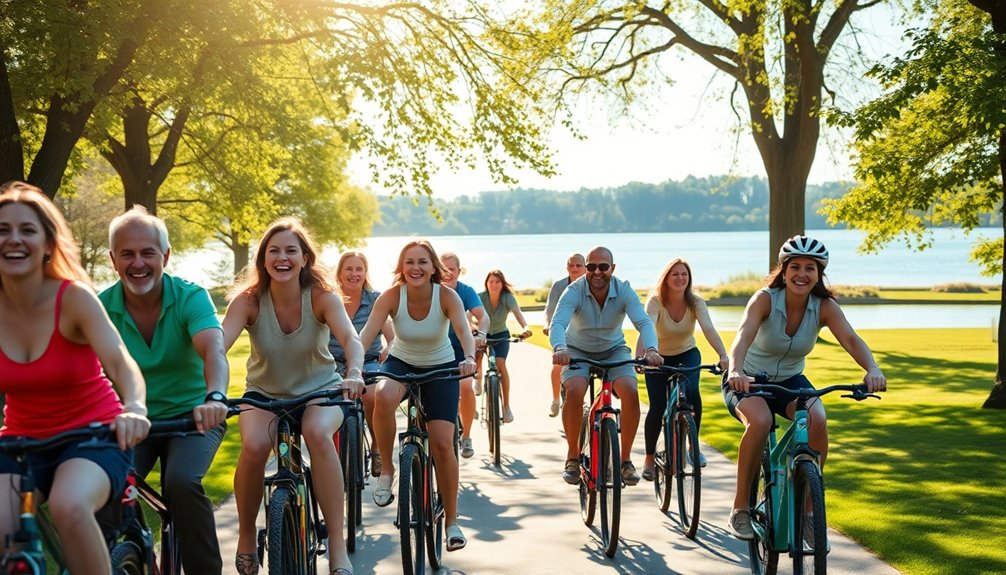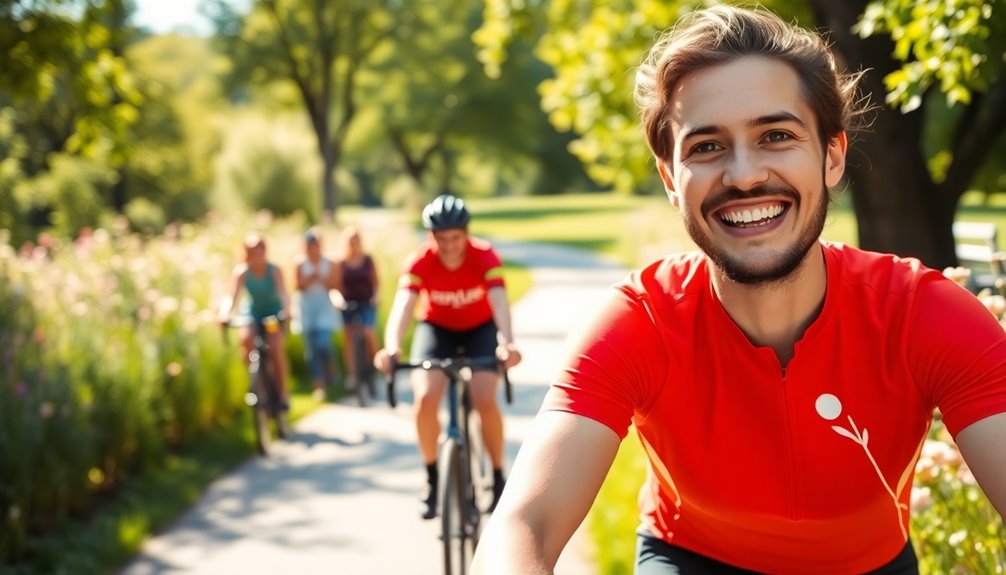Cycling does wonders for your mental health. It helps reduce anxiety and depression by releasing endorphins, making you feel great. When you ride, you can find clarity and mindfulness, allowing negative thoughts to fade away. You also build connections with others, sharing experiences that foster support and understanding. Plus, exploring nature on two wheels boosts your resilience. There's more to discover about how these personal journeys can transform lives, showing just how powerful cycling can be.
Key Takeaways
- Personal journeys reveal cycling reduces anxiety and depression, providing a natural boost to mental health through endorphin release.
- Many individuals find that morning rides enhance focus, simplify thoughts, and promote mindfulness, leading to improved mental clarity.
- Participants report a post-ride euphoria that renews their sense of well-being, reinforcing the therapeutic benefits of cycling.
- Group rides foster community connections, encouraging open discussions about mental health and creating supportive environments for shared experiences.
- Cycling in nature enhances resilience and provides a sense of accomplishment, contributing to emotional stability and improved mental health.
The Therapeutic Benefits of Cycling

When you hop on a bike, you're not just getting exercise; you're tapping into a powerful therapeutic tool that can greatly reduce anxiety and depression.
Cycling releases endorphins during and after your rides, lifting your mood and combating mental health issues. It promotes mindfulness, helping you focus on the present moment while clearing negative thoughts.
Research shows that outdoor cycling, like mountain biking, boosts resilience and self-efficacy, enhancing your overall mental well-being. You'll likely feel accomplished after a ride, which can combat sluggishness and stress.
Plus, cycling fosters a sense of community, offering emotional support and encouraging discussions about mental health challenges in a relaxed environment. Engaging in such activities aligns with the principles of mental wellbeing index, which emphasizes the importance of emotional stability and life satisfaction.
Embrace cycling as an essential part of your mental health toolkit.
Personal Journeys: Overcoming Anxiety Through Biking

Cycling can be a transformative journey for those grappling with anxiety, offering both physical and mental escape. Biking not only helps you stay fit but also fosters a sense of clarity and calm.
Here are some insights into how cycling can empower you:
- Experience joint-friendly exercise, allowing you to cover distances without strain.
- Enjoy morning rides that provide time for personal reflection and sharper focus.
- Simplify your thoughts, promoting mindfulness and reducing negative emotions.
- Benefit from outdoor experiences that enhance resilience and social skills.
- Feel the post-ride euphoria, renewing your sense of well-being.
Engaging in cycling can also help you develop a growth mindset, which is essential for building resilience and overcoming life's challenges.
As you pedal through challenges, you'll discover that biking can truly support your mental health journey.
Mindfulness on Two Wheels

While you ride, your mind can shift into a state of mindfulness, allowing you to fully engage with the world around you.
The rhythmic motion of pedaling helps connect your mind and body, creating a flow that enhances your awareness. As you focus on your immediate surroundings and the sensations of cycling, anxiety fades, making space for clarity and emotional processing.
This active meditation not only clears your thoughts but also promotes health benefits by releasing endorphins that boost your mood.
Studies show that outdoor cycling fosters a connection to nature, reinforcing positive emotional states.
Embracing this mindful experience transforms your rides into moments of peace, ultimately enhancing your mental well-being.
Community Support: Cycling and Connection

As you join others on a ride, the camaraderie that develops can make a significant impact on your mental health. Cycling creates a unique environment for connection, where side-by-side conversations flow more freely, easing the pressure of face-to-face dialogues.
Engaging in group rides fosters a sense of belonging, allowing you to bond over shared experiences and provide emotional support.
Participating in group rides cultivates a sense of belonging, enabling deep connections through shared moments and mutual support.
Here are some benefits of cycling within a community:
- Builds strong emotional connections
- Encourages open discussions about grief
- Provides therapeutic outlets for shared experiences
- Strengthens support networks through social media
- Promotes both physical and emotional well-being
Exploring Nature for Mental Clarity

Riding with a community can uplift your spirits, but venturing into nature takes that experience to another level. When you cycle through mountain trails, the fresh air and sunlight work wonders for your health.
You'll find that exploring these natural landscapes enhances your mental clarity, reducing feelings of anxiety and stress. The rhythmic motion of pedaling through scenic routes promotes mindfulness, allowing you to focus on the ride and push away negative thoughts.
Participants in mountain biking programs often report therapeutic benefits, including a boost in mood and overall mental well-being. Engaging with nature while cycling not only increases resilience and self-efficacy but also strengthens social skills, leading to profound improvements in mental health. Additionally, studies show that hydration is crucial for maintaining optimal brain function, which can further enhance your cycling experience.
The Role of Exercise in Mental Health Treatment

Exercise can be a powerful tool in your mental health treatment.
Engaging in outdoor activities like cycling not only boosts your mood but also enhances resilience and social skills.
Exercise as Therapy
While many people view exercise purely as a way to stay fit, its therapeutic benefits for mental health are profound and well-documented. Engaging in activities like cycling or mountain biking can greatly enhance your mental well-being.
Here are some key benefits of cycling:
- Reduces symptoms of anxiety and depression
- Promotes mindfulness and present-moment awareness
- Builds resilience and self-efficacy
- Enhances social skills through group rides
- Creates safe spaces for emotional expression
Outdoor Activities Benefits
Engaging in outdoor activities like cycling offers a rejuvenating escape that can greatly enhance mental health treatment. A bike ride through nature not only boosts your mood but also reduces symptoms of anxiety and depression.
Research shows that mountain biking fosters resilience and self-efficacy while improving social skills, proving its therapeutic benefits extend beyond just physical exercise. Programs combining outdoor activities with mental health care are becoming popular, with participants reporting enjoyment and significant improvement in their health and well-being. Additionally, engaging in such activities can create a sense of accomplishment and control over one's environment, further promoting emotional well-being.
Cycling as a Tool for Communication

How can cycling transform the way we communicate during tough times? When you hop on a bike, it creates a unique environment for sharing feelings, especially during periods of loss.
Side-by-side cycling eases the pressure of direct conversations, allowing discussions to flow naturally. The rhythm of pedaling fosters a sense of connection, making it easier to tackle difficult topics.
Here are some ways cycling enhances communication:
- Encourages emotional openness
- Reduces pressure of face-to-face dialogue
- Provides natural pauses for reflection
- Creates a supportive group atmosphere
- Fosters companionship through shared experiences
Building Resilience Through Outdoor Activities

When you cycle outdoors, you not only tap into nature's healing power but also strengthen your connections with others.
The challenges you face on your ride can boost your resilience, helping you navigate life's ups and downs more effectively.
Plus, sharing these experiences with fellow cyclists fosters a sense of community that further enhances your mental fortitude.
Nature's Healing Power
While the hustle of daily life can weigh heavily on your mind, stepping into nature through outdoor activities like mountain biking can provide a revitalizing escape.
Riding your bike through scenic trails not only offers fresh air but also enhances resilience and mental well-being.
Consider these benefits of engaging with the outdoors:
- Reduces symptoms of anxiety and depression
- Boosts self-efficacy and confidence
- Promotes enjoyment and fulfillment
- Enhances social skills through group rides
- Serves as a natural complement to traditional treatments, as seen in palliative care versus hospice care.
Community Connection Benefits
Engaging in outdoor activities like cycling not only benefits your physical health but also strengthens community ties that enhance resilience.
When you participate in group rides, you connect with others, sharing experiences and feelings in a supportive environment. This interaction is especially essential during challenging times, like the COVID-19 pandemic, where feelings of isolation can loom large.
The rhythmic nature of cycling side-by-side makes it easier to discuss difficult emotions, fostering deeper connections. Initiatives like New Normal demonstrate how cycling can create safe spaces for bereavement conversations, helping you and others navigate grief together.
Frequently Asked Questions
How Does Cycling Help You Mentally?
Cycling helps you mentally by providing a break from negative thoughts, allowing you to focus on the rhythm of your ride.
You'll feel the endorphins kick in, boosting your mood and creating a sense of elation. As you pedal, your mind clears, enhancing your focus and decision-making.
Plus, being outdoors offers a chance for reflection, helping you process emotions and challenges while enjoying the therapeutic benefits of nature and physical activity.
How Does Cycling Improve Self-Esteem?
Picture yourself conquering a steep hill, the wind in your face, and a rush of exhilaration flowing through you.
Cycling boosts your self-esteem by allowing you to set and achieve personal goals, fostering a sense of accomplishment. As you improve your fitness and endurance, you feel more confident in your body.
Plus, the camaraderie of group rides creates a supportive environment, enhancing your sense of belonging and reinforcing your self-worth as you pedal forward.
Why Does Cycling Make Me Feel so Good?
Cycling makes you feel so good because it releases endorphins, creating that euphoric "high."
When you pedal, you focus on the ride, which helps clear your mind of stress and negativity. Plus, being outdoors in nature boosts your mood and enhances your overall well-being.
The social interactions during group rides foster connections, reducing feelings of isolation.
All these factors combine to elevate your happiness and improve your mental clarity, leaving you feeling refreshed.
Does Cycling Release Trauma?
They say, "Life's a journey, not a destination."
When you cycle, you're not just pedaling; you're releasing trauma. The rhythm of your ride helps you find a meditative state, allowing you to reflect and process emotions.
As you pedal through scenic views, your mind clears, and endorphins kick in, boosting your mood.
Plus, group rides create connections, making it easier to share your experiences and heal together.
Conclusion
Cycling isn't just a way to stay fit; it's a powerful tool for enhancing mental well-being. As you pedal through nature, feeling the wind on your face, can you imagine how your worries fade away with each turn of the wheel? Whether you're overcoming anxiety or finding a supportive community, biking offers a unique escape and a chance for connection. So, why not grab your bike and discover the therapeutic journey waiting for you?









